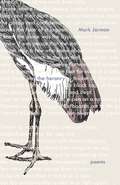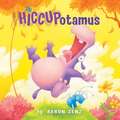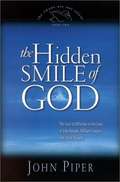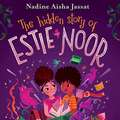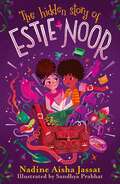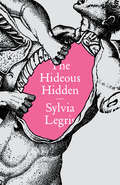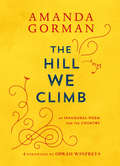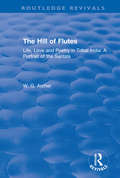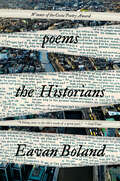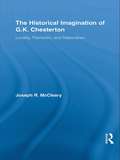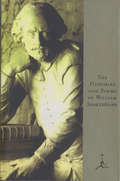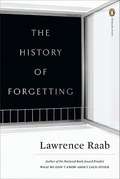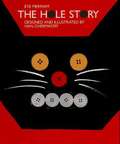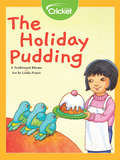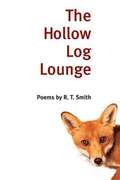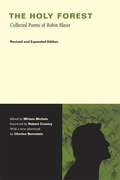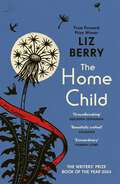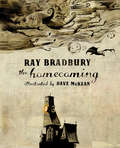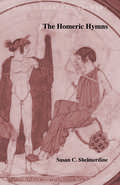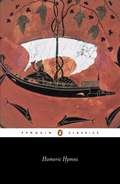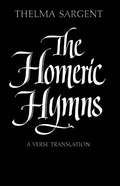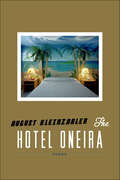- Table View
- List View
The Heronry
by Mark JarmanOrdinary people seek connections to the natural world and each other in the poems ofThe Heronry, a collection that presents a series of spiritual encounters in the form of praise poems, lyric portraiture, and meditations on faith and belief. Mark Jarmanis the author of ten poetry collections. He lives in Nashville, Tennessee.
The Hiccupotamus
by Aaron ZenzCalamity ensues when an elephant, a centipede, and a rhinoceros try finding a cure for hippo's colossal case of hiccups. Cast Bios The part of the Hiccupotamus was played by veteran hippo actor Hank Polowski. Due to a paralyzing fear of fish, some of his scenes in this book were performed by a crew of stunt doubles. Bartholomew Poppins has appeared in over 100 roles in his picture book career. He still dreams of landing a leading part, but is proud of his work in The Hiccupotamus and his cameo as "something squishy" in Mr. Binkers Steps in Something Squishy. Many considered it a risk casting an unknown in the significant elephant role. But it would appear that pachyderm Katie McMurphy has a promising career ahead of her. Following a serious allergic reaction, however, she is currently turning down all parts that involve the use of frosting. Samu Ti speaks no English, which created occasional confusion during his work on The Hiccupotamus. Author Aaron Zenz recalls the time the script called for the centipede to pour cement, but instead Samu began purring like a cat. "The more I shouted 'Pour! Pour!' the louder he'd purr!" This is the final role for Dennis Flott. He is retiring to a small bee-keeping community in North Western Idaho. Good luck, Dennis! We wish you all the best. The part of the buffalo was played by a ground squirrel named Arlo. It took 14 hours in the make-up chair to get him ready each day. Unfortunately, that continually made for a very short window of opportunity to use him in costume.
The Hidden Smile of God: The Fruit of Affliction in the Lives of John Bunyan, William Cowper, and David Brainerd
by John PiperEncourages Christians to persevere by exploring the mysterious ways in which God performed His wonders in the wounded lives of William Cowper, John Bunyan, and David Brainerd.
The Hidden Story of Estie Noor
by Nadine Aisha JassatNo one wanted to hear Estie's side of the story. Now she's on a mission to make sure the truth is heard . . . A page-turning mystery novel in verse about identity, friendship and learning to use your voice, with accessible text and beautiful illustrations throughout. When twelve-year-old Estie is expelled from school, she's sent to stay with her aunt in Scotland over the summer. Even though Estie knows what she did was right. Even though nobody, not even her mum, asked to hear her side of the story. Estie's determined to keep her barriers up and stick to herself until the holidays are over. But when she comes across an intricately folded paper bird with a secret message written inside - a message from someone desperate to tell their own unbelieved story - a chord is struck, and Estie can't help but follow the clues to the next piece of artwork. Who are these messages from? And what will their secret reveal about the town? In helping to uncover the anonymous artist's truth, Estie just might find the words to tell her own. . .
The Hidden Story of Estie Noor
by Nadine Aisha JassatNo one wanted to hear Estie's side of the story. Now she's on a mission to make sure the truth is heard . . . A page-turning mystery novel in verse about identity, friendship and learning to use your voice, with accessible text and beautiful illustrations throughout. When twelve-year-old Estie is expelled from school, she's sent to stay with her aunt in Scotland over the summer. Even though nobody, not even her mum, asked to hear her side of the story. Estie's determined to keep her barriers up and stick to herself until the holidays are over. But when she comes across an intricately folded paper castle with a secret message written inside - a message from someone desperate to tell their own unbelieved story - a chord is struck, and Estie can't help but follow the clues to the next piece of artwork. Who are these messages from? And what will their secret reveal about the town? In helping to uncover the anonymous artist's truth, Estie just might find the words to tell her own. . .
The Hideous Hidden
by Sylvia LegrisFrom the winner of the Griffin Prize, a richly lyrical collection of poems exploring the body’s minutiae In her first full-length collection published in the United States, Sylvia Legris probes and peels, carves and cleaves, amputates and dissects, to reveal the poetic potential of human and animal anatomy. Starting with the Greek writings of Hippocrates and the Latin language of medicine, and drawing from Leonardo da Vinci’s Anatomical Manuscripts, the dermatologist Robert Willan’s On Cutaneous Diseases (1808), and Baudelaire’s The Flowers of Evil, Legris infuses each poem with unique rhythms that roll off the tongue. The Hideous Hidden boldly celebrates anatomy’s wonders: “Renounce the vestibule of non-vital vitals. / Confess the gallbladder, / the glandular wallflowers, / the objectionable oblong spleen.”
The Highest Apple: Sappho and the Lesbian Poetic Tradition (Sapphic Classic)
by Judy GrahnIn 1985, Judy Grahn boldly declared that lesbians have a poetic tradition and mapped it from Sappho to the present day in the groundbreaking book The Highest Apple. With her characteristic ferocious intellect, passion for historical research, careful close readings, and dynamic storytelling, Grahn situated poetry by Sappho, Emily Dickinson, Amy Lowell, H.D., Gertrude Stein, Adrienne Rich Paula Gunn Allen, Audre Lorde, Pat Parker, and Olga Bromas as central to lesbian culture-and more radically as central to society as a whole.In this new and updated edition of The Highest Apple: Sappho and the Lesbian Poetic Tradition, Grahn revisits the original text and amplifies it with a more in depth consideration of Pat Parker and in conversation with two younger lesbian poets, Alicia Mountain and Alyse Knorr, demonstrating the continued relevance and dynamism of The Highest Apple. A new introduction by Grahn and six responses by contemporary poets Donika Kelly, Kim Shuck, Serena Chopra, Zoe Tuck, Saretta Morgan, and Khadijah Queen highlight the ongoing significance of The Highest Apple to readers, writers, and thinkers.
The Hill We Climb: An Inaugural Poem for the Country
by Amanda GormanOn January 20, 2021, Amanda Gorman became the sixth and youngest poet to deliver a poetry reading at a presidential inauguration. Taking the stage after the 46th president of the United States, Joe Biden, Gorman captivated the nation and brought hope to viewers around the globe. Her poem “The Hill We Climb: An Inaugural Poem for the Country” can now be cherished in this special gift edition. Including an enduring foreword by Oprah Winfrey, this keepsake celebrates the promise of America and affirms the power of poetry. <P><P><b>A New York Times Bestseller</b>
The Hill of Flutes: Life, Love and Poetry in Tribal India: A Portrait of the Santals (Routledge Revivals)
by W.G. ArcherOriginally published in 1974, The Hill of Flutes, is a descriptive account of the Santals and their poetry in their heartland of the Santal Parganas. The book explores the Santal world view, including approaches to education, love, sex, and marriage. It describes and discusses Santal dances, festivals and ceremonies, and other key events and gatherings, such as annual hunts. Through the close consideration of song and poetry, The Hills of Flutes offers an engaging insight into life in Santal society.
The Historians: Poems
by Eavan BolandA forceful and moving final volume from one of the most masterful poets of the twentieth century. Throughout her nearly sixty-year career, acclaimed poet Eavan Boland came to be known for her exquisite ability to weave myth, history, and the life of an ordinary woman into mesmerizing poetry. She was an essential voice in both feminist and Irish literature, praised for her "edgy precision, an uncanny sympathy and warmth, an unsettling sense of history" (J. D. McClatchy). Her final volume, The Historians, is the culmination of her signature themes, exploring the ways in which the hidden, sometimes all-but-erased stories of women’s lives can powerfully revise our sense of the past. Two women burning letters in a back garden. A poet who died too young. A mother’s parable to her daughter. Boland listens to women who have long had no agency in the way their stories were told; in the title poem, she writes: "Say the word history: I see / your mother, mine. / … / Their hands are full of words." Addressing Irish suffragettes in the final poem, Boland promises: "We will not leave you behind," a promise that animates each poem in this radiant collection. These extraordinary, intimate narratives cling to the future through memory, anger, and love in ways that rebuke the official record we call history.
The Historical Imagination of G.K. Chesterton: Locality, Patriotism, and Nationalism (Studies in Major Literary Authors)
by Joseph R. McClearyThis study examines a selection of Chesterton’s novels, poetry, and literary criticism and outlines the distinctive philosophy of history that emerges from these writings. Looking at Chesteron's relationship with and influence upon authors including William Cobbett, Sir Walter Scott, Belloc, Shaw, H.G. Wells, Christopher Dawson, Evelyn Waugh, and Marshall McLuhan, McCleary contends that Chesterton’s recurring use of the themes of locality, patriotism, and nationalism embodies a distinctive understanding of what gives history its coherence. The study concludes that Chesterton’s emphasis on locality is the hallmark of his historical philosophy in that it blends the concepts of free will, specificity, and creatureliness which he uses to make sense of history.
The Histories and Poems of Shakespeare
by William ShakespeareThis Modern Library edition presents all ten histories--each complete and unabridged--in the Shakespearean canon, along with notes and glossary. Here are: King John Richard II Henry IV, Part I Henry IV, Part II Henry V Henry VI, Part I Henry VI, Part II Henry VI, Part III Richard III Henry VIII Included also are the Bard's great narrative poems: Venus and Adonis and The Rape of Lucrece, the two works that first established Shakespeare's reputation, plus all 154 of his sonnets. Presented as well are A Lover's Complaint, The Passionate Pilgrim, and The Phoenix and the Turtle.
The History of Forgetting
by Lawrence RaabLawrence Raab's richest work to date-his saddest, funniest, most personal, and most searching book Of Lawrence Raab 's 1972 debut, Mark Strand wrote: "This is a first book with more authority and wisdom in it than most poets are able to manage in their entire careers. I am amazed by its casualness and clarity, its forcefulness, its engrossing strangeness. " Mystery and strangeness remain at the heart of Raab's work, but now they are revealed more fully through the world around us-everyday deceptions, inexplicable violence, unexpected tenderness, the comedy of hope and desire. In one poem, Proust appears in Raab's class to confront a student who disputes the great author's claim that "the true paradises are the lost paradises. " And in the title poem, set just before the Fall, the snake alone understands how people will come to yearn "for whatever they'd lost, and so to survive/ they'd need to forget. " .
The History of Forgetting
by Lawrence RaabLawrence Raab's richest work to date-his saddest, funniest, most personal, and most searching book Of Lawrence Raab 's 1972 debut, Mark Strand wrote: "This is a first book with more authority and wisdom in it than most poets are able to manage in their entire careers. I am amazed by its casualness and clarity, its forcefulness, its engrossing strangeness." Mystery and strangeness remain at the heart of Raab's work, but now they are revealed more fully through the world around us-everyday deceptions, inexplicable violence, unexpected tenderness, the comedy of hope and desire. In one poem, Proust appears in Raab's class to confront a student who disputes the great author's claim that "the true paradises are the lost paradises." And in the title poem, set just before the Fall, the snake alone understands how people will come to yearn "for whatever they'd lost, and so to survive/ they'd need to forget."
The Hole Story
by Eve MerriamDescribes all kinds of different holes, from straws to locks to noodles.
The Holiday Pudding: A Traditional Rhyme
by Cricket MediaChildren will love this traditional holiday poem with repeated words and rhymes about making Christmas pudding, a tasty holiday dessert. Add plums, flour, eggs, and spice and stir it all together!
The Hollow Log Lounge: POEMS
by R. T. Smith"This is no fairy tale. / It's all fantastic and bizarre and true. / It's my life, a raspy song, that sounds better if you sing along." The men and women who live and work near Opelika, Alabama, gather at the Hollow Log Lounge. There, under the watchful eye of the stuffed fox behind the bar, they unload their gripes and worries, tell their stories, argue, joke, commune, complain, and confess. In this collection of poems, R. T. Smith paints a vividly imagined portrait of the community in this small-town bar, capturing the chorus of the patrons' voices echoing off the knotted wood-paneled walls. Smith's stand-in, Sam Buckhannon, scribbles stories heard and overheard as tongues loosened by liquor spin out monologues in which southern idiom and vernacular seem perfectly at home within the constraints of measured verse.
The Holy Forest: Collected Poems of Robin Blaser (Revised and Expanded Edition)
by Robin Blaser Miriam NicholsThe Holy Forest, written over the course of five decades, is Robin Blaser's highly acclaimed lifelong serial poem. This edition includes numerous published volumes of verse, the ongoing "Image-Nation" and "Truth Is Laughter" series, and new work from 1994 to 2004.
The Home Child: from the Forward Prize-winning author of Black Country
by Liz Berry*WINNER OF THE WRITERS' PRIZE - BOOK OF THE YEAR*Inspired by a true story, The Home Child is a beautiful novel-in-verse about a child far from home‘Ground-breaking’ Benjamin Zephaniah‘Beautifully crafted’ Guardian‘Extraordinary’ Hannah LoweIn 1908, Eliza Showell, twelve years old and newly orphaned, boards a ship that will carry her from the slums of the Black Country to rural Nova Scotia. She will never return or see her family again.With nothing to call her own, the wild beauty of her surroundings is the only solace Eliza has – until another Home Child, a boy, arrives at the farm and changes everything.Inspired by the true story of Liz Berry’s great aunt, this spellbinding novel in verse is an exquisite portrait of a girl far from home.‘One of the outstanding books of this year. Although this is a historical tale its resonance is timeless’ Sunday Times‘Deeply moving. A graceful, delicate book, stunning in its emotional depth... I know I'll return to it many times in the future’ Megan Hunter, author of The End We Start From
The Homecoming
by Ray BradburyIllustrated classics for adults! Here, Collins Design's WISP series pairs two legendary creators–writer Ray Bradbury and artist Dave McKean–to create an irresistible package perfect for Halloween and all year 'round.The WISP series (Wonderfully Illustrated Short Pieces) represents an ingenious marriage of two creative forces: the artistry of today's foremost illustrators and the literary legacy of beloved authors of popular short works for adults. The resulting offspring of this union are captivating, full–color illustrated editions of timeless classics that readers will want to savor and collect.For the first time ever, the series makes selected popular short works previously offered only in collections available in a unique, stand–alone format. Also for the first time, WISPs harness the talents of top illustrators for the benefit and delight of a new, older audience.This WISP presents Ray Bradbury's The Homecoming, a little boy's tale of his family reunion of vampires. This story was initially published in 1946 and later refashioned into further stories. Bringing this story to life are the wondrous illustrations of Dave McKean, whose delightful artwork perfectly matches the tale.These one–of–a–kind, attractively priced and invitingly formatted illustrated editions will make a great impulse buy and appeal to a broad audience.
The Homeric Hymns
by Susan C. ShelmerdineThis is a collection of the standard texts of ancient Greek which are important components of what we know about Greek myth, religion, language and culture. All of the works collectively known as the Homeric Hymns are collected and translated here in their entirety, and the work includes ample notes and an introduction to provide information on the works' historic importance, a chronological table, genealogical chart, maps of Greece and the Aegean Islands, and illustrations of vase paintings with mythological themes. This edition is part of the Focus Classical Library.
The Homeric Hymns: A New Prose Translation, And Essays, Literary And Mythological
by HomerComposed for recitation at festivals, these 33 songs were written in honour of the gods and goddesses of the ancient Greek pantheon. They recount the key episodes in the lives of the gods, and dramatise the moments when they first appear before mortals. Together they offer the most vivid picture we have of the Greek view of the relationship between the divine and human worlds.
The Homeric Hymns: A Verse Translation
by Thelma SargentSpuriously attributed to Homer, the hymns and invocations collected in this book constitute, alongside The Iliad and The Odyssey the great sources of ancient Greek poetry. Now Thelma Sargent has rendered these works into a lucid and beautiful English verse. Accompanying the translated texts is a discussion of Greek meter and a explanation written by Sargent of her translation.
The Hotel Oneira: Poems
by August KleinzahlerA thrilling new collection from one of the most original poets of his generation"His work is a modernist swirl of sex, surrealism, urban life and melancholy with a jazzy backbeat." That praise appeared in the pages of The New York Times in 2005, but it applies no less to August Kleinzahler's newest collection. Kleinzahler's poetry is, as ever, concerned with permeability: Voices, places, the real and the dreamed, the present and the past, all mingle together in verses that always ring true. Whether the poem is three lines long or spans several pages; whether the voice embodied is that of "an adult male of late middle age, // about to weep among the avocados and citrus fruits / in a vast, overlit room next to a bosomy Cuban grandma" as in "Whitney Houston," or that of the title character in "Hootie Bill Do Polonius," who is bidding "adios compadre // To a most galuptious scene Kid"—Kleinzahler finds the throbbing human heart at the core of experience. This is a poet searching for—and finding—a cadence to suit life as it's lived today. Kleinzahler's verses are, as noted in the judges' citation for the 2004 Griffin Poetry Prize (which he won for his collection The Strange Hours Travelers Keep), "ferociously on the move, between locations, between forms, between registers." The Hotel Oneira finds Kleinzahler at his shape-shifting, acrobatic best, unearthing the "moments of grace" buried under the detritus of our hectic, modern lives.
